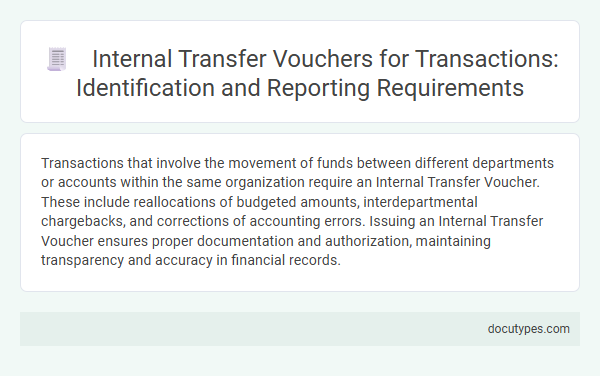Transactions that involve the movement of funds between different departments or accounts within the same organization require an Internal Transfer Voucher. These include reallocations of budgeted amounts, interdepartmental chargebacks, and corrections of accounting errors. Issuing an Internal Transfer Voucher ensures proper documentation and authorization, maintaining transparency and accuracy in financial records.
Overview of Internal Transfer Vouchers
Internal Transfer Vouchers document the movement of assets, funds, or inventory between departments or branches within the same organization. These vouchers ensure accurate record-keeping and accountability for all internal transactions.
Transactions requiring an Internal Transfer Voucher typically include inter-departmental asset transfers, fund reallocations, and inventory movements. Your organization must use these vouchers to maintain audit trails and prevent discrepancies. Proper use supports financial transparency and operational efficiency across all units.
Purpose and Importance in Financial Reporting
| Transaction Type | Purpose | Importance in Financial Reporting |
|---|---|---|
| Interdepartmental Transfers | To document the movement of assets or funds between departments within the same organization | Ensures clarity in cost allocation and internal accountability, supporting accurate departmental financial statements |
| Internal Fund Transfers | Records the redistribution of cash or budgeted funds among organizational units | Maintains integrity of cash flow reports and prevents misstatement of financial positions |
| Asset Reallocations | Tracks the transfer of fixed assets or inventory within company branches or divisions | Facilitates proper asset management and depreciation scheduling for precise balance sheet representation |
| Cost Center Adjustments | Reflects internal cost reassignments to align expenses with the correct cost centers | Enhances expense tracking accuracy and supports detailed budgeting and variance analysis |
| Internal Loan Settlements | Documents transfers related to temporary internal borrowings or settlements | Improves transparency of inter-unit financial obligations and aids in consolidation procedures |
Key Identification Requirements for Transfer Vouchers
Internal Transfer Vouchers are essential for documenting transactions that involve the movement of assets, funds, or inventory between different departments or locations within the same organization. These transactions require clear identification to ensure accurate tracking and accountability.
Key identification requirements for transfer vouchers include specifying the origin and destination departments, detailed descriptions of the items or amounts transferred, and the date of the transaction. You must also include authorization signatures and reference numbers to validate and facilitate internal audits.
Documentation Standards and Best Practices
Transactions involving the movement of funds or assets between departments, branches, or accounts within the same organization require an Internal Transfer Voucher (ITV) to ensure clear documentation. Proper ITV documentation includes detailed descriptions of the transaction, dates, amounts, and authorized signatures to maintain accountability and facilitate auditing. Following standardized ITV procedures helps prevent errors, fraud, and miscommunication across internal financial operations.
Processing Procedures for Internal Transfers
Internal Transfer Vouchers are required for transactions involving the movement of assets or funds between different departments or branches within the same organization. These vouchers ensure proper documentation and authorization, maintaining accurate financial records. The processing procedures mandate verification of transfer details, approval from designated authorities, and entry into the internal accounting system to uphold transparency and control.
Controls and Authorization Protocols
Internal Transfer Vouchers are required for transactions involving movement of assets or funds between accounts within the same organization. This ensures adherence to controls and authorization protocols, maintaining financial integrity and accountability.
- Asset Relocations - Transfers of fixed or current assets between departments demand an internal transfer voucher to track authorization and ensure accurate accounting.
- Interdepartmental Fund Transfers - Moving funds between internal cost centers requires documented approval to prevent unauthorized reallocations.
- Inventory Adjustments - Shifts of inventory stock within company locations must be recorded using an internal transfer voucher to maintain stock accuracy and control.
Common Challenges and Mitigation Strategies
Internal transfer vouchers are required for transactions involving the movement of assets or funds between departments or accounts within the same organization. These vouchers ensure proper documentation and accountability for internal reallocations.
Common challenges include inaccurate data entry, delayed approvals, and lack of standardized procedures, which can lead to discrepancies in financial records. Implementing automated workflows and conducting regular audits can mitigate these issues effectively.
Recordkeeping and Audit Trail Requirements
Which transactions require an Internal Transfer Voucher to ensure proper recordkeeping and audit trail requirements? Transactions involving the movement of assets or funds between departments or accounts must be documented with an Internal Transfer Voucher. This process maintains transparency, supports accurate financial records, and facilitates compliance during audits.
Regulatory Compliance and Reporting Obligations
Internal transfer vouchers are essential for documenting interdepartmental or intercompany transactions to ensure regulatory compliance. Accurate reporting of these transactions helps meet statutory audit requirements and enhances financial transparency.
- Regulatory Compliance - Transactions involving movement of funds or assets within an organization require vouchers to comply with financial regulations and internal control standards.
- Audit Trail Maintenance - Vouchers provide a clear audit trail that supports verification and validation during internal and external audits.
- Reporting Obligations - Proper documentation through internal transfer vouchers ensures your financial statements accurately reflect inter-unit transfers as mandated by accounting standards.
Which Transactions Require an Internal Transfer Voucher? Infographic

